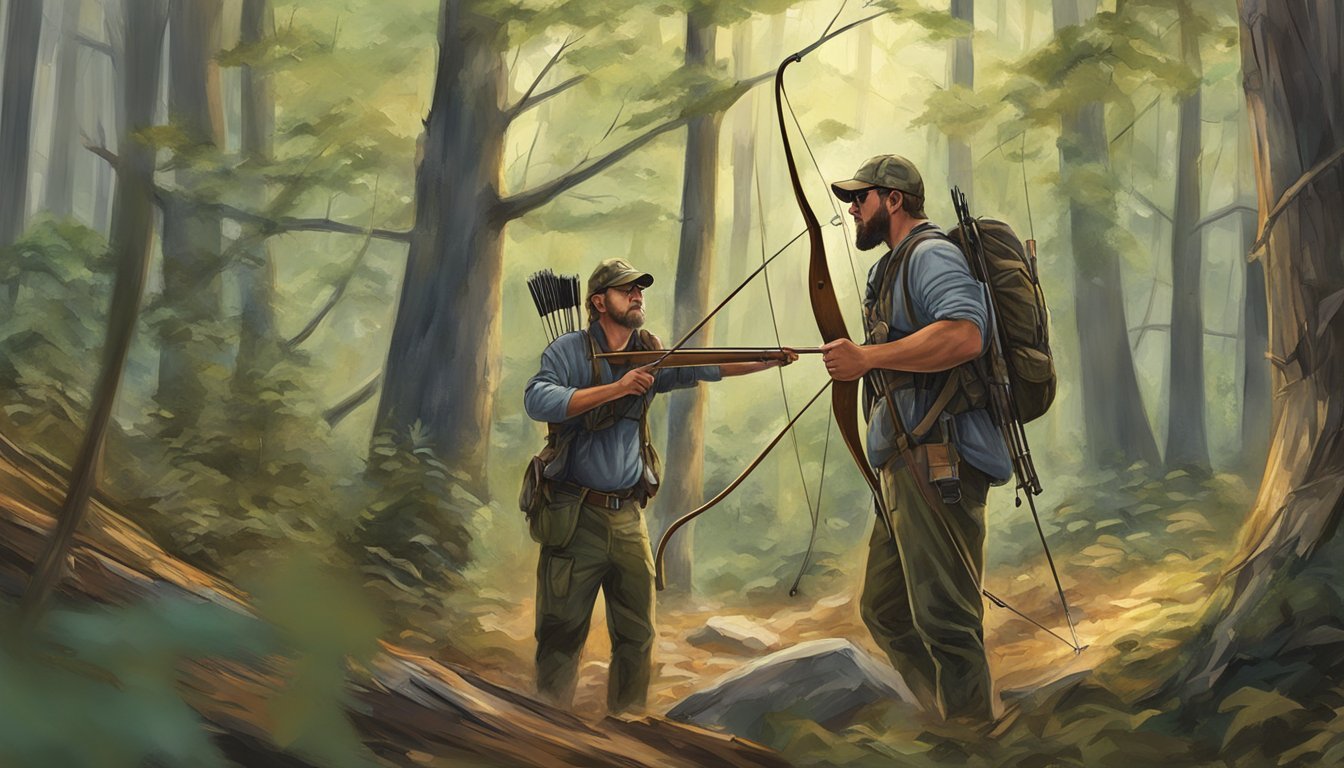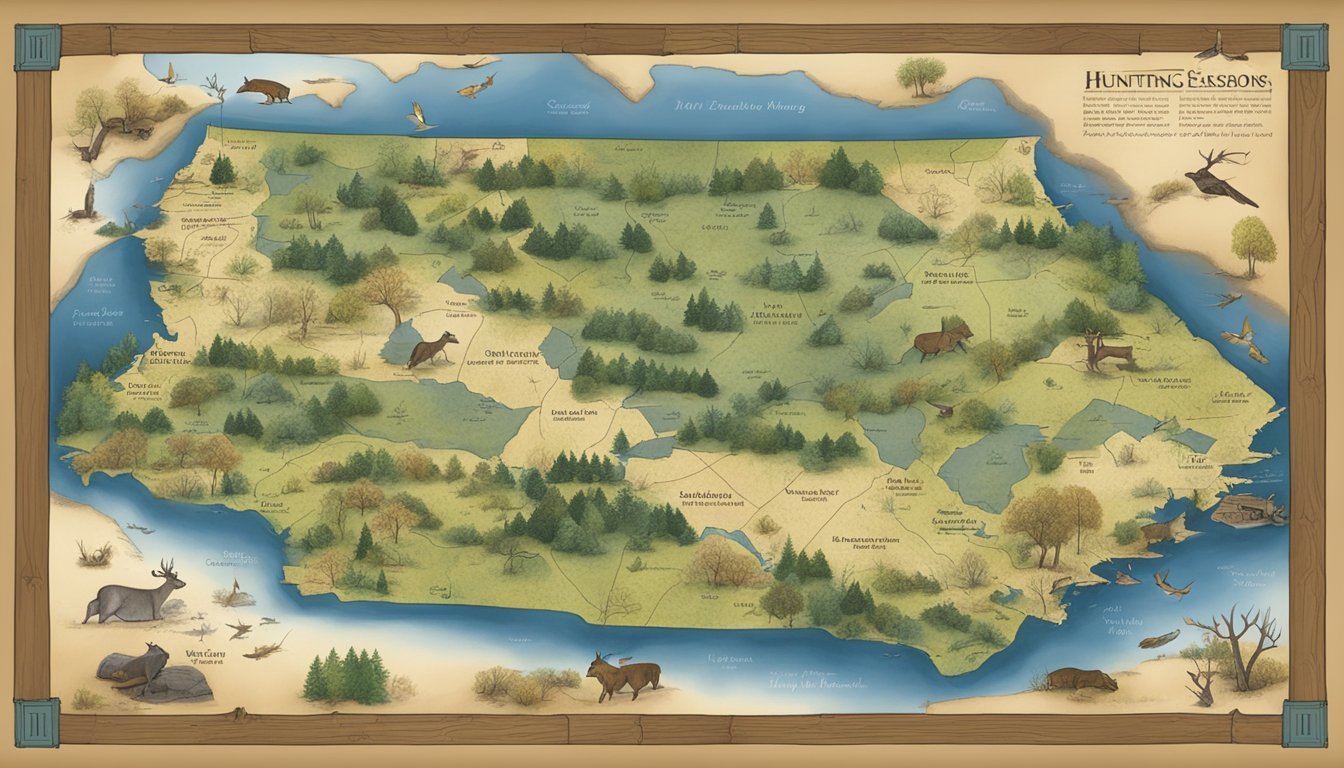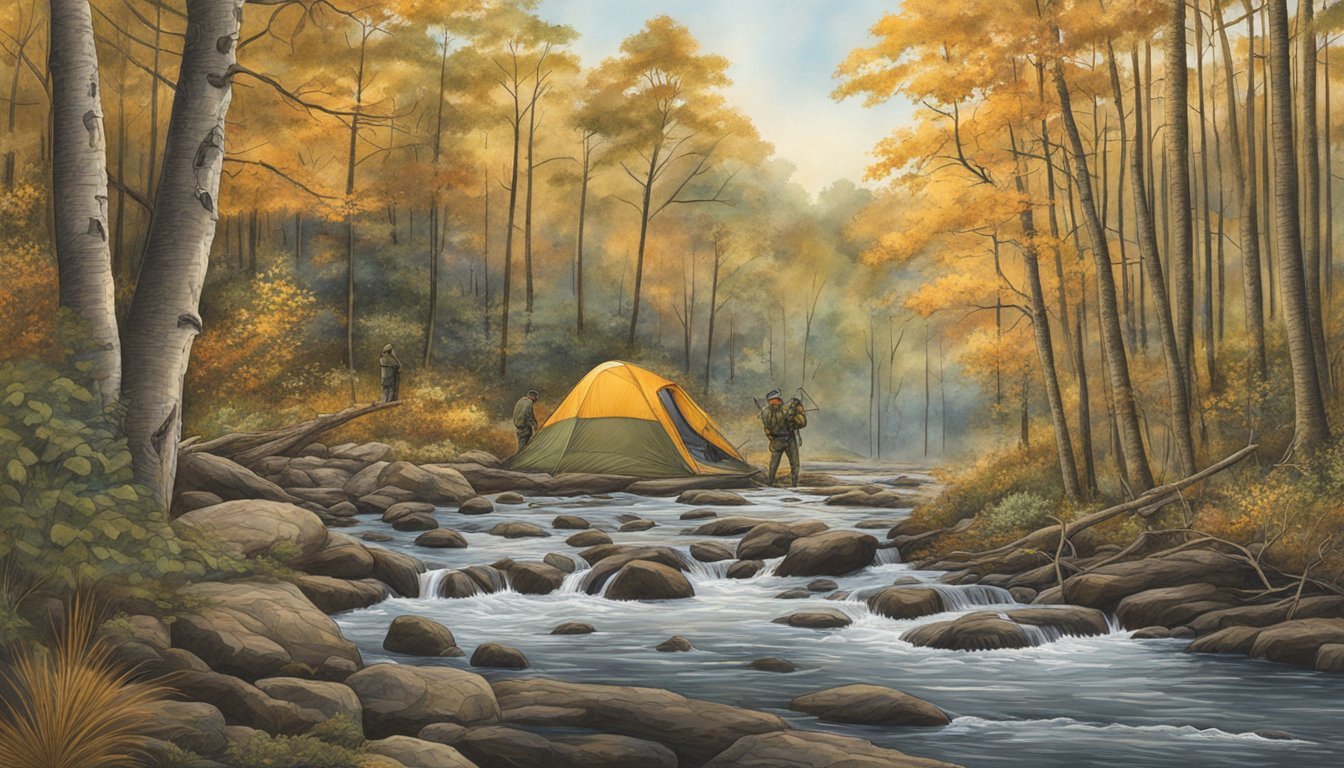Hunting Seasons in North Carolina
Essential Dates and Regulations
This Article is Part of Our Hunting Seasons Guide for All 50 US States
North Carolina offers a diverse range of hunting seasons to cater to the passion and sport of hunters in the region. With a careful balance between preserving wildlife populations and providing recreational opportunities, the state has established specific dates and regulations for different hunting seasons. The North Carolina Wildlife Resources Commission meticulously compiles these rules to ensure sustainability and safety among the hunting community. Hunters must refer to the official compendium for comprehensive details regarding hunting laws, seasons, and bag limits as they vary by county and the type of game.
Hunting in North Carolina isn't just a pastime; it's integral to managing wildlife populations and habitats. One significant aspect of the hunting seasons is the management of deer populations, which includes specific dates for using various firearms. Hunters need to be aware of these dates as well as the corresponding legal weapons permitted for use during these times. Additionally, it's crucial to remain vigilant for any signs of disease in deer populations, reporting any sickly animals to local authorities to help maintain the health of the state's wildlife.
The state's commitment to keeping hunters informed about changes to regulations reflects in the efforts made by the North Carolina Wildlife Resources Commission. Each year, significant updates and modifications to hunting policies are communicated to ensure that hunters are aware of new requirements or changes in the law. Staying informed about these changes is as important as understanding the fundamental regulations, as it allows for a responsible and lawful hunting experience in North Carolina.
Overview of North Carolina Hunting Seasons
The North Carolina hunting seasons offer a diverse set of opportunities for hunters targeting various species. From the majestic mountains to the coastal plains, each region presents unique hunting experiences catered to species-specific seasons.
General Season Dates
Deer Season: North Carolina's deer season is segmented into archery, muzzleloader, and gun seasons, each with specific dates based on regions.
Archery: Typically begins in September and runs through mid-October.
Muzzleloader: Generally starts mid-October and lasts for about two weeks.
Gun: Usually opens in mid-November and extends into early January.
Species-Specific Seasons
Turkey Hunting Season: Spring season spans April to May, with a separate fall season in select counties.
Black Bear Hunting Season: Occurs primarily in the fall, with dates varying by the specific Bear Management Units.
Small Game Hunting Season: Encompasses species like rabbit, quail, pheasant, and fox squirrel, with seasons generally running from late fall through the end of February.
Regional Variations
In North Carolina, hunting season dates and regulations can differ significantly across regions such as the mountains (e.g., Avery, Burke, Caldwell), Piedmont (e.g., Guilford, Forsyth), and the coast (e.g., Bladen, Cumberland). Zones like northeastern and southeastern areas have distinct season lengths, especially for deer hunting, due to local wildlife management strategies.
Youth and Veteran Hunting Opportunities
Specific days are set aside for youth and veterans to encourage hunting participation:
Youth Deer Hunting Day: Occurs on the Saturday before the opening day of archery season for deer.
Special opportunities are also offered during various seasons for both youth and veterans, providing them with first chances or exclusive days to hunt certain species.
Hunting Licenses and Permits
In North Carolina, engaging in hunting and trapping activities requires obtaining the correct licenses and permits, which are issued to ensure sustainable wildlife management and to offer various hunting opportunities to sportsmen.
License Requirements
Every hunter or trapper in North Carolina must possess an appropriate license. These licenses come in several forms depending on the type of activity and whether the individual is a resident or non-resident. The Annual Comprehensive Hunting License caters to most hunting needs, allowing individuals to hunt on both private and game lands. Additionally, a Big Game Privilege may be added or included within certain licenses for those aiming to hunt species classified as big game.
Lifetime Licenses are available for those who wish to make a long-term investment.
Unified Sportsman License allows for both inland fishing and hunting of big game, small game, and waterfowl.
For those who only seek the thrill of the chase during a particular season, there are Annual Licenses tailored to specific periods.
Hunters should also be aware of required tagging and report cards which are necessary for harvesting certain species.
Permit Regulations
Permits add another layer of regulation designed to manage specific wildlife populations and hunting activities. There are Permit Hunting Opportunities on game lands where hunters must apply for and receive a permit to hunt. Specific hunts may be designated for Disabled Sportsmen or may target species like the Tundra Swan, which are managed through a specialized permit system.
Bag Limits are strictly enforced and vary by species and location.
Permit use is critical in areas and seasons where wildlife management strategies dictate controlled hunting numbers, such as the extended gun deer season in designated counties.
All hunters and trappers must strictly adhere to the license and permit requirements, which are in place to promote ethical hunting practices and maintain North Carolina's diverse wildlife populations for future generations.
Hunting Methods and Gear
In North Carolina, hunters have a variety of methods and gear to choose from, including firearms, archery, trapping, and fishing. Each method requires specific skills and equipment, and regulations may vary by season and area.
Firearms and Archery
Firearms: During the gun season, hunters can use a range of firearms including shotguns, rifles, and handguns. It is important to check the local regulations for restrictions on caliber or barrel length. North Carolina also has specific regulations for hunting with blackpowder firearms during the designated black powder season.
Legal Firearms: Hunters should consult the North Carolina Wildlife Resources Commission to understand the legal firearms permissible for each hunting season.
Archery: The archery season typically includes the urban archery season, providing additional opportunities in designated urban areas. For those using archery equipment, options include:
Compound bows
Recurve bows
Longbows
Crossbows (Regulations specify when and where crossbows can be legally used)
Note: Following the legal weapon guidelines is critical for all hunters in order to ensure compliance with state regulations.
Trapping and Fishing
Trapping: When it comes to trapping, individuals must possess valid trapping licenses. The state requires trappers to use humane and approved traps and check them regularly.
Trapping Regulations: Detailed information on seasons, bag limits, and legal trapping methods is available through the Wildlife Resources Commission.
Fishing: Alongside hunting, fishing is a regulated activity and requires a license. The state offers freshwater and saltwater fishing opportunities, with specific seasons and limits based on the species.
Legal Fishing Methods:
Hook and line
Fly fishing
Spearfishing (restrictions apply)
For both trapping and fishing, the North Carolina Wildlife Resources Commission provides a compendium of rules that hunters and anglers should become familiar with to ensure ethical and lawful practices.
Hunting Regulations and Conservation
In North Carolina, the intricate balance between enjoying wildlife resources and ensuring their continuity for future generations is governed by carefully crafted regulations. The Wildlife Resources Commission plays a pivotal role in this, orchestrating a framework that allows for ethical hunting practices while prioritizing conservation.
Wildlife Management
The North Carolina Wildlife Resources Commission establishes hunting regulations annually, which include specific season dates, bag limits, and legal weapons authorized for use. These regulations are designed not only for the sportsmanship of hunting but also to manage wildlife populations effectively. For example, recent changes extended antlerless gun deer season to encourage controlled deer population management across several counties, thus maintaining a healthy ecosystem.
Species Conservation Status
Conservation measures are directly influenced by the conservation status of species. Certain regulations are in place to protect species that are classified as threatened or endangered. Restrictions may limit hunting seasons and bag limits or implement protections for non-game animals. For instance, waterfowl and rails have specific hunting seasons and bag limits to prevent overharvesting and ensure their populations remain stable.
Legal and Ethical Hunting Practices
North Carolina emphasizes legal and ethical hunting practices. Hunters are required to obtain a valid hunting license and are encouraged to familiarize themselves with the rules before participating. It's not just about adhering to the letter of the law—ethical practices include respecting private lands, adhering to trespass laws, and following safety guidelines. The Landowner Protection Act, for instance, underscores the necessity for hunters to have written permission to hunt on private lands, underscoring respect for landowner rights and safety.
Maps and Resources
For hunters in North Carolina, accurate maps and reliable resources are indispensable for a successful and lawful hunting experience. These materials provide information on deer zone boundaries and public hunting lands, ensuring hunters can plan accordingly.
Deer Zone Maps
Deer zone maps are critical for hunters to understand where they can legally hunt. The North Carolina Wildlife Resources Commission provides detailed maps that distinguish between different deer hunting zones. These zones are defined by specific regulations and season dates, which are important for managing the deer population and following state guidelines. Hunters should refer to the most current maps before each season to avoid any changes that may have been implemented.
Public Hunting Areas
Public hunting areas, often referred to as game lands, are managed areas where individuals are permitted to hunt. In North Carolina, there are over two million acres of game lands. The Wildlife Resources Commission offers maps that show boundaries and specific areas within game lands. These maps also include information about the types of game that may be hunted in each area and any restrictions that apply. Hunters can use these maps to plan their outings and ensure they are hunting within legal boundaries.
Safety and Education
In North Carolina, education and adherence to safety guidelines are paramount for a responsible hunting season. Effective hunting requires a knowledge foundation and a commitment to safety and ethical practices.
Hunter Education
Hunter education is mandatory for anyone pursuing a hunting license who was born on or after January 1, 1960. The North Carolina Wildlife Resources Commission provides comprehensive courses that cover firearms, wildlife management, outdoor ethics, hunting laws, and survival.
Mandatory Course: Before obtaining a license, hunters must complete the hunter education course.
Accessible Formats: Courses are offered online, in a classroom, or through a home study program to suit various learning preferences.
Safety Guidelines
The state imposes strict safety guidelines to protect both hunters and wildlife. Adherence to these rules is essential for a secure hunting experience.
Blaze Orange Requirement: While hunting game with firearms, wearing blaze orange is obligatory to increase visibility.
Firearm Handling: Hunters are advised to treat every firearm as if it's loaded and to keep the muzzle pointed in a safe direction at all times.
It's the responsibility of all hunters to maintain the safety of themselves and others, as well as to practice ethical hunting to preserve wildlife populations for future generations.
Economic Impact and Hunting Culture
In North Carolina, hunting is not only an outdoor activity but also a significant economic driver and an integral part of the state's cultural tapestry.
Economic Aspects
Economic contributions stem largely from hunting-related expenditures in wildlife management areas (WMAs). Hunters and anglers directly affect the local and state economies through their expenditure on licenses, equipment, and various additional services. North Carolina boasts over 2 million acres of huntable land, which facilitates a variety of hunting seasons and engenders substantial economic activity each year.
Licenses: Essential for all hunters, the sale of hunting licenses represents a steady income stream for conservation efforts.
Equipment and Services: Hunters spend on gear, accommodation, and travel, injecting financial resources into local businesses.
Particularly, deer hunting stands out as a key activity. It involves approximately 250,000 participants annually; substantial considering the costs associated with gear and permits.
Cultural Significance of Hunting
Hunting carries a rich cultural heritage in North Carolina, with traditions often passed down through generations. The activity is not merely a means to an end but embodies the cultural fabric of the state.
Traditions: Established hunting seasons create an annual rhythm that many communities partake in, strengthening social bonds and fostering a sense of continuity.
Cultural Events: Opening days of hunting seasons serve as local landmarks and social gatherings, contributing to North Carolina’s societal structure.
Deer hunting in particular holds a revered space within this cultural context. It is not just the most popular form of hunting but also a conduit for passionate public engagement during regulatory changes, shaping the hunting culture's preservation and evolution.
Seasonal Hunting Checklists
Before venturing out for a hunt, proper preparation ensures compliance with regulations and enhances safety. After the hunt, thorough processing and reporting secure the hunter’s investment and maintain the respect for wildlife conservation.
Preparation Checklist
Licenses and Permits:
Verify that the hunter has a current hunting license and the appropriate game permits.
Check for any e-stamp requirements, particularly for waterfowl.
Gear:
Prepare appropriate clothing for the season and terrain.
Ensure firearms or bows are in working order and suitable for the intended game.
Regulations:
Review the North Carolina Wildlife Resources Commission guidelines for the target game.
Observe all seasons and bag limits as per the latest published regulations.
Post-Hunting Checklist
Game Processing:
Efficiently and ethically process the game, adhering to the best practices for field dressing and butchering.
Regulations and Reporting:
Report any harvested game as required.
Verify that all game taken complies with local antlerless gun deer season rules or other species-specific regulations.
Licenses and Permits:
Ensure all tags and reporting associated with licenses and permits are completed and submitted within the established deadlines.
Frequently Asked Questions
What licenses are required for hunting in North Carolina? In North Carolina, hunters are required to have a valid hunting license, which may include a state hunting license and additional permits or stamps for specific game species. License requirements vary depending on the age, residency status, and the species being hunted.
Are there any specific permits I need? Certain species, such as bear or deer, may require additional tags or permits. It is essential for hunters to check the North Carolina Wildlife Resources Commission for updates on required permits.
What are the general regulations that hunters should be aware of? Hunters are expected to follow all state hunting regulations, including wearing of blaze orange, obtaining landowner permission where necessary, and adhering to bag limits. Regulations are subject to change, so they should review the official guidelines each season.
When does the hunting season typically start and end? Season dates vary by game species and are set annually. For example:
Deer: Archery season typically begins in September, while gun season may start in November.
Bear: Dates range, potentially from October to January.
Are there restrictions on the types of weapons used during certain seasons? Yes, different seasons may be designated for archery, muzzleloader, or modern firearms, restricting the use of certain weapons accordingly.
Where can hunters find the most current information? The North Carolina Wildlife Resources Commission is the authoritative source for the most current season dates, regulations, and licensing requirements. Hunters should reference the commission's website or contact them directly for up-to-date information.







